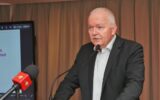

COLOMBO : President Ranil Wickramasinghe in a message on the birth anniversary of the late President J,R. Jayawardena said if Sri Lanka had been able to sustain the socio-economic reforms initiated by Jayawardena in 1977, the nation would be a developed country today. President Wickremesinghe conveyed this sentiment on the occasion of Jayawardena’s 117th birth anniversary, while he is currently on an official visit to the United States of America to attend the 78th session of the United Nations General Assembly.
During the late President’s birth anniversary commemoration held on Monday at the Jayawardene Center in Colombo 07, former speaker Mr. Karu Jayasuriya delivered the keynote address. The President’s message was presented by Mrs. Chamika Mummullage, Senior Assistant Secretary to the President, highlighting Mr. J. R. Jayawardene’s revolutionary impact on the nation’s socio-economic landscape. President Wickremesinghe emphasized that challenges such as riots, terrorism and a failure to fully grasp the philosophy hindered the complete success of these reforms. He also noted that neighbouring countries like India, China and Vietnam, which transitioned from closed and socialist economic practices, studied Mr. Jayawardene’s approach and prospered by adapting their policies to the changing times.
J. R. Jayawardena embarked on his political journey in 1938 as an active member of the Sri Lanka Congress Party. In 1946, he switched his allegiance to the United National Party and assumed the role of Finance Minister in Sri Lanka’s inaugural cabinet. Following the passing of Prime Minister Dudley Senanayake in 1973, J. R. Jayawardena assumed leadership of the United National Party.
In the 1977 elections, J. R. Jayawardena was elected as the Prime Minister of Sri Lanka. During his tenure, he introduced the executive presidential system through a national constitution. In 1978, he became the first Executive President and relocated to Jayawardenapura, the legislative capital of Colombo. He dedicated his life to advancing social justice, promoting culture, education and fostering economic development in Sri Lanka.
Furthermore, President Jayawardena’s political and economic reforms played a pivotal role in modernizing Sri Lanka’s social system, transforming it into a modern state. His significant contributions extended beyond national borders as he served as the sixth Secretary-General of the Non-Aligned Movement, leaving an indelible mark on the international stage.
On this 117th commemoration of Mr. Jayawardena, let us honour his noble social mission for the country. I extend my heartfelt gratitude to all those, including the Secretary-General of the Jayawardena Centre, who has been instrumental in preserving his legacy.
















